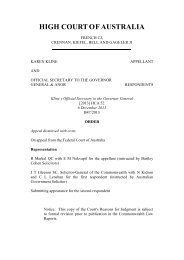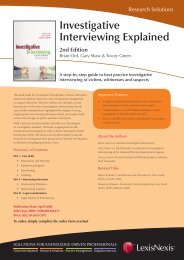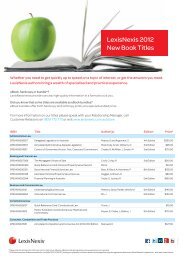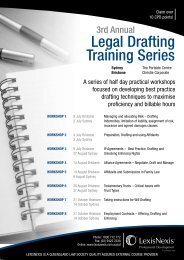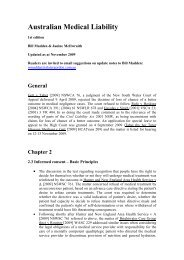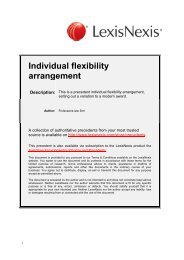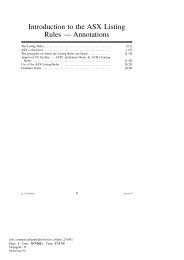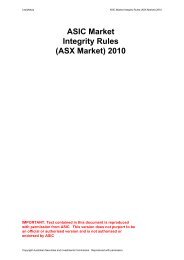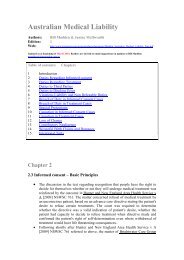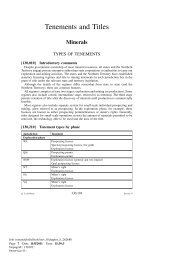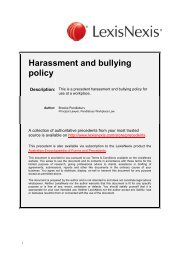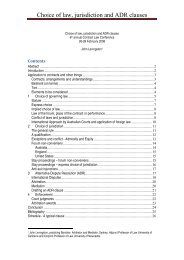Copyright LexisNexis. Sample only, not for classroom use or ...
Copyright LexisNexis. Sample only, not for classroom use or ...
Copyright LexisNexis. Sample only, not for classroom use or ...
Create successful ePaper yourself
Turn your PDF publications into a flip-book with our unique Google optimized e-Paper software.
PRINCIPLES OF AUSTRALIAN EQUITY AND TRUSTS<br />
12.43 In relation to the types of conduct by the represent<strong>or</strong> that could be said to induce the<br />
assumption, in Commonwealth v Verwayen, at CLR 444; ALR 356, Deane J said the following:<br />
The cases indicate four main, but <strong>not</strong> exhaustive, categ<strong>or</strong>ies in which an affirmative answer to that<br />
question may be justified, namely, where that party:<br />
(a) has induced the assumption by express <strong>or</strong> implied representation;<br />
(b) has entered into contractual <strong>or</strong> other material relations with the other party on the<br />
conventional basis of the assumption;<br />
(c) has exercised against the other party rights which would exist <strong>only</strong> if the assumption were<br />
c<strong>or</strong>rect;<br />
(d) knew that the other party laboured under the assumption and refrained from c<strong>or</strong>recting him<br />
when it was his duty in conscience to do so.<br />
Reliance<br />
12.44 The relying party must act, <strong>or</strong> refrain from acting, in reliance on the assumption. A causal<br />
link between the assumption and the action <strong>or</strong> conduct by the relying party must be established. It is<br />
<strong>not</strong> necessary that the assumption be the <strong>only</strong> reason that the relying party acted <strong>or</strong> refrained from<br />
acting. It is sufficient if it was a reason: Flinn v Flinn [1999] 3 VR 712 at 749. The action <strong>or</strong> conduct<br />
undertaken must be reasonable in all the circumstances: Waltons St<strong>or</strong>es v Maher at CLR 406; ALR<br />
525. In Commonwealth Bank of Australia v Carotino (Australia) Pty Ltd [2011] SASC 42 at [145],<br />
Kelly J said:<br />
[R]eliance on the assumption must be reasonable in two ways. First, it must be reasonable <strong>f<strong>or</strong></strong> the<br />
[relying party] to adopt the assumption in question on the strength of the representation made.<br />
Secondly, the action taken by the [relying party] in reliance upon the representation must be itself<br />
reasonable.<br />
12.45 An imp<strong>or</strong>tant fact<strong>or</strong> in assessing reasonableness here will be the characteristics of the relying<br />
party, including whether he <strong>or</strong> she is advised by lawyers, and whether he <strong>or</strong> she is well resourced<br />
and <strong>use</strong>d to dealing in commercial transactions. In cases of substantial commercial enterprises that<br />
are legally represented, the court will carefully scrutinise whether the relying party’s actions are<br />
reasonable. If <strong>not</strong>, an estoppel claim will be denied: Austotel Pty Ltd v Franklins Selfserve Pty Ltd at<br />
585. In Waltons St<strong>or</strong>es v Maher, although the Mahers were legally represented, the facts were such<br />
that both the Mahers and their solicit<strong>or</strong>s were encouraged and induced to make the same mistake,<br />
thereby <strong>not</strong> precluding the finding of an estoppel.<br />
Knowledge <strong>or</strong> intention<br />
12.46 Acc<strong>or</strong>ding to Brennan J in Waltons St<strong>or</strong>es v Maher, the represent<strong>or</strong> must actually know,<br />
<strong>or</strong> intend, that the relying party will act <strong>or</strong> refrain from acting in reliance on the assumption <strong>or</strong><br />
expectation. In cases of assumptions based upon a promise <strong>or</strong> representation, knowledge is ‘easily<br />
inferred’. In cases where the assumption arises outside the context of a promise <strong>or</strong> representation,<br />
the requirement of knowledge <strong>or</strong> intention is m<strong>or</strong>e difficult to establish: Waltons St<strong>or</strong>es v Maher<br />
at CLR 423; ALR 538. However, it can be established, as was the case in Waltons St<strong>or</strong>es v Maher, in<br />
cases where ‘the defendant encourages a plaintiff to adhere to an assumption <strong>or</strong> expectation already<br />
<strong>f<strong>or</strong></strong>med, <strong>or</strong> acquiesces in an assumption <strong>or</strong> expectation when, in conscience, objection ought to be<br />
stated’: Pazta Company Pty Ltd v Idelake Pty Ltd [2008] NSWSC 941 at [26].<br />
<strong>Copyright</strong> <strong>LexisNexis</strong>. <strong>Sample</strong> <strong>only</strong>, <strong>not</strong> <strong>f<strong>or</strong></strong> <strong>classroom</strong> <strong>use</strong> <strong>or</strong> distribution.<br />
278<br />
Spi-Radan & Stewart - Principles of Australian Equity and Trusts 2nd ed. Ch.12.indd 278 10/10/2012 05:22:31<br />
200595



